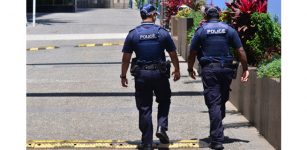Police Officer Who Endangered Victim Refuses to Testify

A Queensland Police officer who was found to have illegally accessed the police database and leaked a domestic violence victim’s address to her abusive former partner – a man who is reported to be his ‘mate’- has relied upon the ‘privilege against self-incrimination’ to avoid answering questions about the conduct.
Yet, the officer has not been suspended let alone dismissed or charged, and remains in the police service.
Refusal to answer
It has been reported the senior constable declined to answer questions at a hearing in the Queensland Civil and Administrative Tribunal (QCAT) regarding the breach of privacy, instead invoking his privilege against self-incrimination.
The woman whose details were leaked, known as ‘Julie*’, is fighting for compensation after being forced into hiding when the officer accessed the Queensland Police Service (QPS) database, QPrime, without authorisation and provided Julie’s new address to her violent former partner.
The officer is reported to have even joked via text message with his abusive ‘mate’ that Julie* would “flip out” after discovering she had been tracked down.
Guilty of misconduct
A complaint was made to Queensland’s Crime and Corruption Commission (CCC) about the incident, but the police watchdog saw fit to refer the case back to police for an internal investigation.
The police investigation found that the officer had engaged in misconduct, but he was not charged over his actions, dismissed from his position or even suspended.
Officer fears being disciplined
The has not spoken publicly about the incident.
But in a prepared statement to QCAT, he expressed concerns that others were pushing for him to be disciplined and that – in the circumstances – he would not be answering the tribunal’s questions. The statement reads:
“I have been informed by my solicitor that… a complaint has been made against me which is being investigated by the crime and corruption commission [CCC]. I have been informed the complaint directly relates to the allegations I mentioned earlier [and] I wish to advise the tribunal at the outset that I am claiming self-incrimination privilege under the QCAT act … and I decline to answer any questions which may touch those allegations.”
What is the privilege against self-incrimination?
The privilege against self-incrimination – or ‘pleading the fifth’ as it is known in the United States – entitles a person to refuse to answer questions or produce document which would tend to incriminate them in an offence.
The privilege is extended to individuals, but does not apply to corporations. It is embodied in Evidence Act across the nation.
The privilege against self-incrimination in NSW
In NSW, a magistrate or judge retains the power to order a witness to answer questions if it serves the interest of justice.
In the event that false evidence is given, criminal proceedings can be brought against the witness for perjury or attempting to pervert the course of justice.
The privilege is contained in section 128 of the Evidence Act 1995 (NSW), which is relevant where a witness objects to giving particular evidence, or evidence on a particular matter, on the ground that the evidence may tend to prove that the witness:
- has committed an offence against or arising under an Australian law or a law of a foreign country, or
- is liable to a civil penalty.
In that situation, the court must determine whether there are ‘reasonable grounds for the objection’.
If there are such grounds, the court must tell the witness they are not required to give the evidence unless ordered to do so, and that if they nevertheless willingly give the evidence they will be issued with a ‘certificate’ protecting them from proceedings arising from the information contained in the evidence.
However, a witness can be ordered to give the evidence if:
- it does not tend to prove that the witness has committed an offence against or arising under, or is liable to a civil penalty under, a law of a foreign country, and
- the interests of justice require that the witness give the evidence.
In that case, the court must issue the witness with the mentioned certificate.
Refusal to answer questions
The senior constable is reported to have invoked the privilege a total of six times when asked questions about whether he understood the meaning of a breach of privacy, the rules of access to the QPrime system, and the rules around the disclosure of information.
As a result, the QCAT member overseeing the hearing, Susan Gardiner, disallowed dozens of questions asked by Julie to witnesses.
“There is not a lot of point to asking me to listen to evidence that is not relevant to what I have to decide,” Gardiner said during the hearing. “I have to decide whether the service took sufficient steps to guarantee your privacy.”
Julie is representing herself while a barrister and legal team are representing the government in the case.
A police employee is reported to have told the hearing that the QPrime data system was capable of restricting access to details for vulnerable groups, such as domestic violence victims, but that no steps had ever been taken to do so.
“It seemed this particular police officer was able to fairly readily access the system for his own purposes and didn’t need any other level of access,” Gardiner remarked.
The tribunal also heard that police were required to complete a number of online training courses, including information security, and that the officer had failed some in the past.
Uphill battle for Julie
The tribunal accepts as matter of fact that a breach of Julie’s privacy occurred.
However, the government is arguing it cannot be held responsible under the applicable legislation for the rogue actions of a police officer.
This argument is being made after the QCAT removed the officer as a respondent on the basis that individual police officers cannot be liable for privacy breaches.
The QPS has fought Julie’s battle for compensation her every step of the way, at first making written submissions arguing that the officer in question should not be required to attend the hearing.
Ms Gardiner has asked for additional submissions and reserved her decision. The case is expected to be finalised some time next year.
In the meantime, the CCC has launched a fresh investigation relating to a Hyundai Sonata which belonged to Julie’s former husband, but was transferred to the officer in question in 2015.








